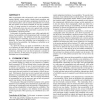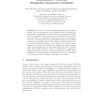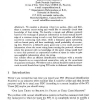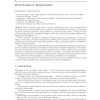163 search results - page 11 / 33 » Computationally Convincing Proofs of Knowledge |
ICS
2010
Tsinghua U.
14 years 5 months ago
2010
Tsinghua U.
: Design of secure systems can often be expressed as ensuring that some property is maintained at every step of a distributed computation among mutually-untrusting parties. Special...
CCS
2010
ACM
13 years 7 months ago
2010
ACM
Many cryptographic tasks and protocols, such as non-repudiation, contract-signing, voting, auction, identity-based encryption, and certain forms of secure multi-party computation,...
CRYPTO
2009
Springer
14 years 2 months ago
2009
Springer
We construct an efficient delegatable anonymous credentials system. Users can anonymously and unlinkably obtain credentials from any authority, delegate their credentials to other ...
EUROCRYPT
1995
Springer
13 years 11 months ago
1995
Springer
We coiisider a situation where two parties, Alice and Bob, share a common secret string arid would like to mutually check their knowledge of that string. We describe a simple and e...
BIRTHDAY
2008
Springer
13 years 9 months ago
2008
Springer
This is a discursive paper. That is, it shows some formulas (but only as examples so that the reader may be convinced that there is, perhaps, some substance to our claims), no theo...



